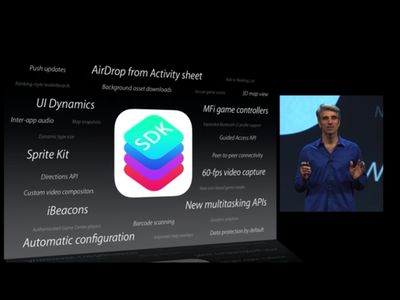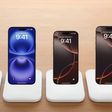Apple Retail Stores to Integrate iBeacon Systems to Assist with Sales and Services
Earlier this year at the keynote during its annual Worldwide Developers Conference, Apple mentioned iBeacon microlocation APIs as a new part of its SDK, which are designed to access location data through the Bluetooth Low Energy profile on iOS devices. Now, the company is preparing to integrate iBeacon systems into its retail locations, which will intially help with customer sales and later be implemented to assist with in-store services such as workshops and Genius Bar appointments, reports 9To5Mac.

According to the report, the integration of iBeacons within Apple's stores will be used in cohesion with a future update to the Apple Store app, which can give detailed information on a product when a user walks near an item. While Apple currently utilizes interactive iPad displays for many of its first-party products in-store, the updated Apple Store app would help users get information about the many products on shelves.
Apple is said to have begun stocking up on iBeacon transmitters, and the company, in the next few days, will begin installing these sensors in many Apple Stores across the United States. These transmitters will be placed on the tables that house Apple products in addition to store shelves holding accessories. The technology will serve as a way to both improve the Apple shopping experience, and in-turn, boost product sales.
Furthermore, Apple is also testing its new iBeacon-based retail system to better provide services in its stores, such as notifying consumers about upcoming workshops, locating customers for Genius bar appointments, and allowing consumers to be informed of a repaired product ready for pickup. This deeper integration of services will reportedly be implemented after the initial roll out of the updated Apple Store app and iBeacons, and would allow for greater accuracy in locating customers within stores compared to the capabilities of the current app.
The company is also looking to integrate an indoor mapping feature in a future version of Maps for iOS, which would help users navigate through buildings and stores, and could also be used with iBeacon technology to provide greater information within an area. A report in September stated that Apple was working on tapping into the power of the M7 motion coprocessor to add additional mapping enhancements in future software updates, and it is possible that indoor mapping and iBeacon technology could work in cohesion with the motion-sensing chip for greater mapping information overall.
Earlier this year, Apple was said to be collaborating with Major League Baseball to utilize iBeacon APIs to enhance its MLB.com At the Ballpark app to create interactive experiences for its fans at stadiums. 9To5Mac also notes that Apple is also rumored to be testing a program allowing iOS developers to easily integrate the iBeacon API into third-party apps. While iBeacons can be currently implemented into existing apps by iOS developers, Apple has yet to provide a straightforward development program for the API.
Popular Stories
While the iPhone 17 Pro and iPhone 17 Pro Max are not expected to launch until September, there are already plenty of rumors about the devices.
Below, we recap key changes rumored for the iPhone 17 Pro models as of April 2025:
Aluminum frame: iPhone 17 Pro models are rumored to have an aluminum frame, whereas the iPhone 15 Pro and iPhone 16 Pro models have a titanium frame, and the iPhone ...
Apple is preparing a "bold" new iPhone Pro model for the iPhone's 20th anniversary in 2027, according to Bloomberg's Mark Gurman. As part of what's being described as a "major shake-up," Apple is said to be developing a design that makes more extensive use of glass – and this could point directly to the display itself.
Here's the case for Apple releasing a truly all-screen iPhone with no...
Apple may have updated several iPads and Macs late last year and early this year, but there are still multiple new devices that we're looking forward to seeing in 2025. Most will come in September or October, but there could be a few surprises before then.
We've rounded up a list of everything that we're still waiting to see from Apple in 2025.
iPhone 17, 17 Air, and 17 Pro - We get...
The first iOS 19 beta is less than two months away, and there are already a handful of new features that are expected with the update.
Apple should release the first iOS 19 beta to developers immediately following the WWDC 2025 keynote, which is scheduled for Monday, June 9. Following beta testing, the update should be released to the general public in September.
Below, we recap the key...
Apple's upcoming foldable iPhone (or "iPhone Fold") will feature two screens as part of its book-style design, and a Chinese leaker claims to know the resolutions for both of them.
According to the Weibo-based account Digital Chat Station, the inner display, which is approximately 7.76 inches, will use a 2,713 x 1,920 resolution and feature "under-screen camera technology." Meanwhile, the...
A common complaint about the iPad Pro is that the iPadOS software platform fails to fully take advantage of the device's powerful hardware.
That could soon change.
Bloomberg's Mark Gurman today said that iPadOS 19 will be "more like macOS."
Gurman said that iPadOS 19 will be "more like a Mac" in three ways:Improved productivity
Improved multitasking
Improved app window management...
Apple is working on a new version of the Vision Pro with two key advantages over the current model, according to Bloomberg's Mark Gurman.
Specifically, in his Power On newsletter today, Gurman said Apple is developing a new headset that is both lighter and less expensive than the current Vision Pro, which starts at $3,499 in the U.S. and weighs up to 1.5 pounds.
Gurman said Apple is also...
Apple has confirmed that it will be permanently closing its retail store in the heart of Bristol, England, and there is no replacement in sight.
Apple Bristol in 2023
Apple Bristol will be closing its doors on Saturday, August 9, due to redevelopment plans at the Cabot Circus Shopping Centre, and the adjacent Bristol Shopping Quarter. According to news reports, and a building application, the ...
Apple today updated its vintage products list to add the 2018 Mac mini and the iPhone 6s, devices that will get more limited service and repairs now that they are considered vintage.
The iPhone 6s initially launched in 2015, but Apple kept it around as a low-cost device until 2018, which is why it is only now being added to the vintage list. The iPhone 6s had Apple's A9 chip, and it was...
























